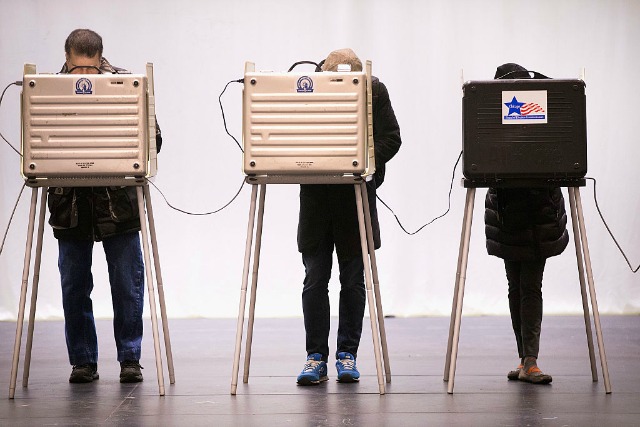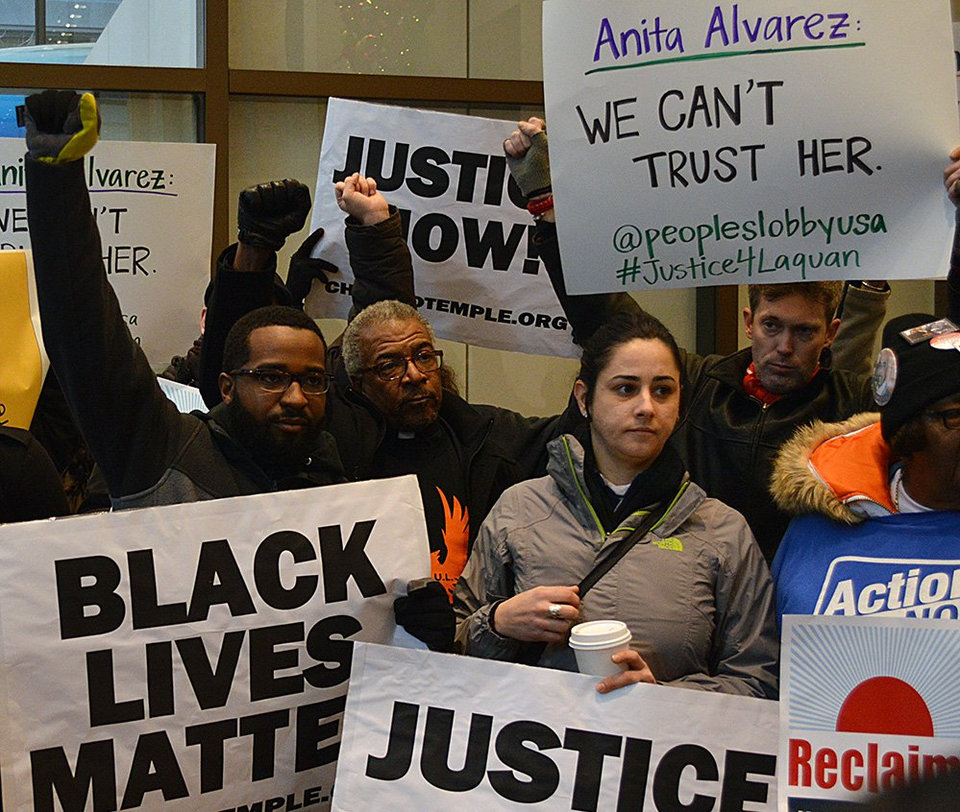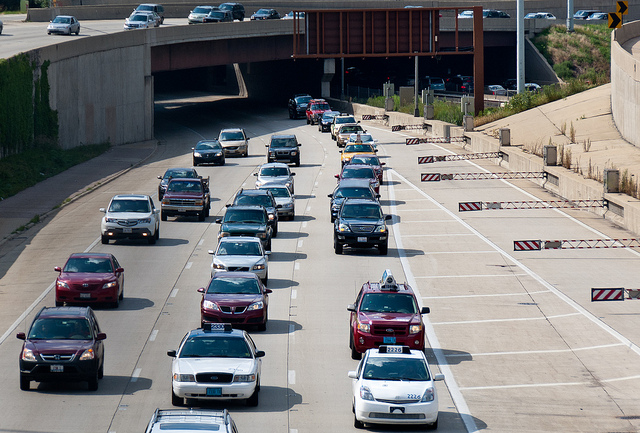Why You Should Definitely Go Vote In Your Local Races, Chicago
By aaroncynic in News on Oct 25, 2016 7:02PM

CHICAGO, IL - MARCH 15: Voters casts their ballots at ChiArts High School on March 15, 2016 in Chicago, Illinois. Voters in Illinois, Missouri, North Carolina, Florida and Ohio vote in primary elections today. (Photo by Scott Olson/Getty Images)
While the focus of election 2016 has been squarely on America’s longest and most vitriolic contest for president in recent memory, there’s more at stake on Nov. 8 than who will take up residence at 1600 Pennsylvania.
While Illinois, which hasn’t voted for a Republican presidential candidate in more than two decades, isn’t a swing state, it’s a battleground in its own right. Hundreds of posts are up for grabs this fall, including a U.S. Senate seat, all 18 Congressional Districts, the State Comptroller’s office, nearly all of the legislature in Springfield, appellate, circuit and subcircuit judges, various posts in Cook County, one state constitutional amendment, and several non-binding referendum questions.
While voter-shaming is not a thing we’re going to take part in—choosing not to vote can be its own form of protest and plenty of social struggles were fought and won outside ballot boxes—going to the polls means more than checking a box for President. Here’s a look at some of what else is at stake in Chicago and Illinois.
At the top of the ticket locally lies the race for U.S. Senate, where incumbent Mark Kirk is defending his seat from challenger Representative Tammy Duckworth. Kirk has had an uphill battle and still trails in several polls. A moderate Republican, particularly by today’s standards, Kirk supported stronger gun control measures and same-sex marriage and even bucked his own party by voting against defunding Planned Parenthood. Very early in the race, he even walked back his support of Republican Presidential nominee Donald Trump, citing the carnival barker’s temperament and inflammatory rhetoric.
None of that, however, might be enough for Kirk to save his seat from two-term House Rep and Iraq War vet Tammy Duckworth, the Democrat challenging Kirk this year. Duckworth has consistently gone after Kirk not only for his initial support of the leader of fascism’s revival Trump, but the sitting senator’s many controversial remarks, including the time he called President Barack Obama a “drug dealer in chief,” and fellow Republican Sen. Lindsey Graham a “bro with no ho.” And while being in the minority party of Congress can make it difficult to get legislation pushed through, Duckworth has touted her work on several pieces of legislation on veteran’s care as a measure of success as a House rep. If you've been hoping to see a change in the Senate's majority party, this is a chance to make that happen.
Much like every election after the Supreme Court’s Citizen’s United decision in 2010, this year’s race to fill the state legislature in Springfield will be one of the most expensive in history. Gov. Bruce Rauner and his allies are pouring untold amounts of money into state legislative races, along with the race for Comptroller’s office. So far, Rauner and his campaign have dumped an astonishing $45.8 million into various races around the state. In fact, $21 million of the $29 million the Illinois Republican Party has raised has come from the governor. One of his biggest backers, Citadel CEO Ken Griffin, has also spent big, pouring more than $11,000,000 into this cycle this year according to FEC filings.
Rauner and his allies have a twofold goal: to loosen Democratic control over the legislature and retain key allies across the state, which has essentially turned the election into a proxy war between Rauner and Democratic House Speaker Michael Madigan.
State Comptroller Leslie Munger was appointed by the governor in 2015 after the death of Judy Baar Topinka, and has since presided over the office during one of the worst budget crises in Illinois history. She’s been Rauner’s right hand through the budget impasse and has voiced agreement with many of the governor’s policy ideas, but has repeatedly attempted to assert she and her office operate independently. Munger’s critics include challenger Susana Mendoza, now the Chicago City Clerk, who has accused her of allowing the Comptroller’s office to become a “wholly owned subsidiary of the governor’s office.”
The pair will face off in one televised debate Tuesday night at 7 p.m. on WTTW-Ch. 11's "Chicago Tonight."
In addition to national and local legislative representatives, Chicagoans will also be voting on three Cook County offices - Recorder of Deeds, Circuit Court Clerk and State's Attorney. The Democratic primary for the office of State's Attorney received national attention when incumbent Anita Alvarez, who came under fire in handling numerous cases where police killed citizens, including Rekia Boyd and Laquan McDonald, was ousted by Kim Foxx. She faces a lesser-known Republican challenger, Christopher Pfannkuche, who served as a county prosecutor for 31 years.

(By Aaron Cynic/Chicagoist)
Finally, voters in Chicago will also have the ability to voice their opinions in a few binding referenda and many non-binding advisory referenda questions. Among them include:
- Countywide: Whether the Recorder of Deeds should be eliminated and merged with the Cook County Clerk's Office.
- Countywide: Whether there should be a state law to mandate that workers receive earned sick time.
- Citywide: Whether the state should make gun trafficking a felony and require gun shop owners and employees undergo background checks.
- Citywide: Whether the state should provide 'full and equitable' funding to the Chicago Public Schools.
- Citywide: Whether the city should work with state and federal officials on prioritizing infrastructure projects.
You can find the full list here, as well as where to vote in the City here.
Perhaps the most talked-about ballot initiative is the Transportation Funds Amendment. The so-called “transportation lockbox” would amend the Illinois constitution to mandate that all transportation-derived funds (vehicle title and license fees, gasoline taxes, tolls, etc.) must be directed solely to transportation-related programs.
Public support for the amendment is robust. According to a survey by the Paul Simon Public Policy Institute at SIU-C, 80 percent of likely voters support the ballot measure. Backing is also strong from prominent advocacy organization Active Transportation Alliance in addition to commerce chambers and labor unions like the AFL-CIO.
But there is discord, as well, perhaps unsurprising given Illinois’ ongoing budget woes—and, by extension, the threat that other funds already vulnerable for raiding would be made more so by such constraints. You can see a fracture even within transit forums like The Chainlink biking message board and in the pages of transit-news site Streetsblog Chicago, where Deputy Editor Steven Vance and Editor John Greenfield present differing (and compelling) arguments.
It’s safe to say that Illinois lawmakers have failed in terms of budgeting, but it is ultimately their responsibility, not that of the constitution. Opponents of the measure who argue that the lockbox is merely the handiwork of contractor-and-construction unions are peddling a bogeyman canard (hi again, Tribune Editorial Board!); but the few, Democratic lawmakers who opposed the measure in the General Assembly make a good case against constitutional spending prioritization:
“Without a doubt, there should be strong protections for investment in our road, bridges, ports, and rails. But experience has demonstrated that unexpected events can have drastic impacts on our state budget. A major natural disaster or economic turmoil can blow huge holes in a budget, even in states in healthy financial condition—which Illinois is decidedly not.”
That said, a degree of guaranteed funding for the kinds of transit projects we truly love is a pretty excellent consolation prize.
A list of early-voting sites is available here and a map of those locations can be found here.
